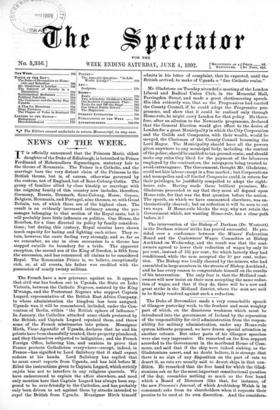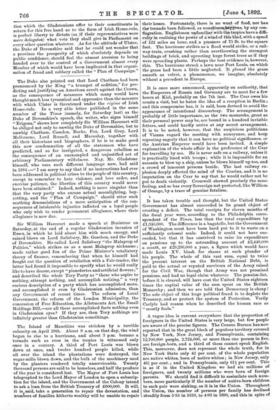The Duke of Devonshire made a very remarkable speech at
Glasgow yesterday week, to the freshest and most weighty part of which, on the disastrous weakness which must be introduced into the government of Ireland by the separation of the responsibility for civil administration from the respon- sibility for military administration, under any Home-rule system hitherto proposed, we have drawn special attention in another column. But other parts of his Glasgow speeches were also very impressive. He remarked on the firm support accorded to the Government in the moribund House of Com- mons, and said that if the ship were indeed sinking, as the Gladstonians assert, and no doubt believe, it is strange that there is no sign of any disposition on the part of rats to desert it, as rats are usually said to desert ships in that con- dition. He remarked that the free hand for which the Glad- stonians ask on far the most important constitutional question of the day, resembles nothing so much as the free hand which a Board of Directors (like that, for instance, of the new Freeman's Journal, of which Archbishop Walsh is in command) asks from its shareholders when it requests their proxies to be used at its own discretion. And the considera.
tion which the Gladstonians offer to their constituents in return for this free hand as to the form of Irish Home-rule, is perfect liberty to dictate (as if their representatives were mere delegates) what vote they shall give in Parliament on every other question whatever. As for the attitude of Ulster, the Duke of Devonshire said that he could not wonder that a province the prosperity of which absolutely depends on public confidence, should feel the utmost aversion to being handed over to the control of a Government almost every Member of which would have been implicated in that organi- sation of fraud and robbery called the "Plan of Campaign."



































 Previous page
Previous page